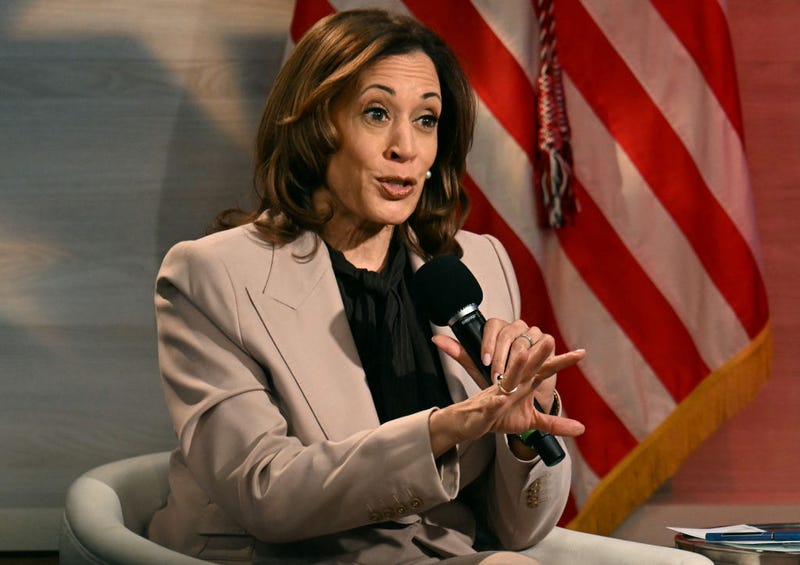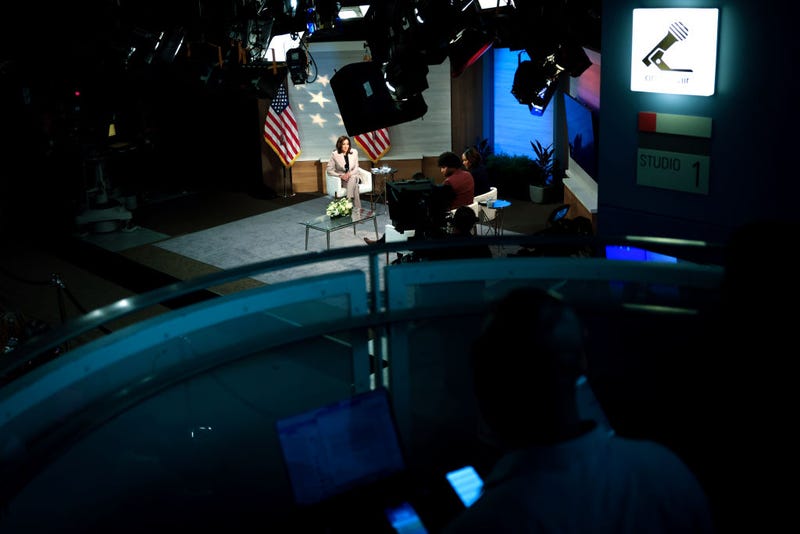
PHILADELPHIA (KYW Newsradio) — Vice President Kamala Harris on Tuesday blasted her Republican opponent Donald Trump for causing a dangerous situation in Springfield, Ohio, by spreading lies about the Haitian immigrant community there, saying voters should make sure he “can’t have that microphone again.” It was her most passionate moment in a 45-minute interview with a panel of Black journalists.
Two days after Secret Service agents foiled an apparent assassination attempt on Trump, who blamed Democratic rhetoric for the latest threat to his life, Harris said she checked in with the former president to see if he was okay.
But, sitting for a rare extended campaign interview with a trio of journalists from the National Association of Black Journalists, Harris spared Trump no criticism for the threats of violence in Springfield that have followed allegations, amplified by her opponent and his running mate, that Haitian immigrants are kidnapping and eating people’s pets — even as the state's Republican governor and other officials insist there is no evidence of such behavior.
She spoke emotionally about the impact of such incendiary rhetoric on immigrants, saying the Republican attacks on the city and its migrant community were “lies that are grounded in tropes that are age old.”
“You cannot be entrusted to stand behind the seal of the president of the United States engaging in that hateful rhetoric that is designed to divide us,” she said.
“When you have that kind of microphone in front of you, you really ought to understand at a deep level that your words have meaning."
Apart from the threats to immigrants, she also noted the conservative Project 2025 blueprint for the next Republican administration and a GOP-led effort to restrict abortion access.
Harris said that “there are far too many people in our country right now who are not feeling safe.”
“Not everybody has Secret Service," she said. “Members of the LGBTQ community don’t feel safe right now. Immigrants or people with an immigrant background don’t feel safe right now. Women don’t feel safe right now."
A contrast between candidates
The vice president’s sedate exchange with the National Association of Black Journalists was quite different from that of the former president seven weeks ago. Whereas Trump lambasted his NABJ moderators, calling them “rude” and “nasty” and denouncing their questions as “horrible,” Harris referred to the reporters who pressed her as “esteemed journalists.”

Tuesday's event was moderated by Eugene Daniels of Politico, Gerren Keith Gaynor of theGrio and Tonya Mosley of Philadelphia-area public radio station WHYY, which co-hosted the gathering with NABJ.
When Trump appeared at the NABJ conference in Chicago in July, his comments were often met with shock and confusion from the room, drawing laughter, boos and groans from his audience, which largely consisted of student journalists and media professionals. The audience on Tuesday, also made up of NABJ members and college students, was inaudible.
Trump made a series of incendiary comments about the vice president’s racial identity, saying she “turned Black” at some point in her professional career. And he has since repeatedly questioned Harris’ racial identity on the campaign trail and during their presidential debate in Philadelphia earlier this month.
Harris, the daughter of a Jamaican father and an Indian mother, has repeatedly dismissed Trump’s remarks as “the same old show.” During her debate with Trump, she said it was a “tragedy” that he had “attempted to use race to divide the American people.”
On Black voters, the economy, Israel-Hamas war
The panel on Tuesday pressed her for specifics on issues such as gun control, reparations for slavery, limits on abortions and the war in Gaza. Harris, for the most part, offered few new details and stuck to her campaign talking points.

The vice president insisted she is working to earn the vote of Black men and not taking any constituency for granted. Black male voters are traditionally one of the most consistently Democratic-leaning demographics in the nation. But Republicans have tried to make inroads, while Democrats worry about flagging enthusiasm at the polls.
“I think it’s very important to not operate from the assumption that Black men are in anybody’s pocket,” Harris said. “Black men are like any other voting group. You gotta earn their vote, so I’m working to earn the vote, not assuming I’m gonna have it because I’m Black”
Harris declined to say if she supported reparations for descendants of slaves, but said, “we need to speak truth about the generational impact of our history in terms of the generational impact of slavery, the generational impact of redlining." She expressed openness to studying the question "to figure out exactly what we need to do,” but said her focus was on building economic opportunity.
Asked whether Americans are better off today than four years ago when she and President Joe Biden entered office, Harris did not directly answer the question, instead referencing the state of the economy during the COVID-19 pandemic and bringing up her plans to try to lower housing costs and promoting herself as a “new generation” of leader.
Harris said her candidacy offers the country a chance at “turning the page on an era that sadly has shown us attempts by some to incite fear to create division in our country."
Asked whether she would change U.S. policy toward the Israel-Hamas war, Harris said she endorsed President Joe Biden's pause on 2000-lb. bombs to Israel.
Harris noted the killing of Israeli civilians — and some Americans — by Hamas on Oct. 7 and added that far too many "innocent Palestinians have been killed" in Israel's response.
She added that the Israel-Hamas war has to end and a ceasefire and hostage deal must get done. She called for a two-state solution to the Israel-Palestinian conflict and said a little bit about what would be involved: “that there be no re-occupation of Gaza, that there be no changing of territorial lines, that there be an ability to have security in the region for all concerned.
The goal, she said, is to ensure “the Israelis have security and Palestinians in equal measure have security, have self-determination and dignity.”
